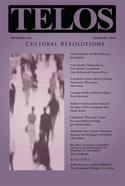Danilo Breschi’s “From Politics to Lifestyle and/or Anti-Politics: Political Culture and the Sense for the State in Post-Communist Italy” appears in Telos 163 (Summer 2013). Read the full version online at the Telos Online website, or purchase a print copy of the issue in our store.
 In Italy, the transition from communism to post-communism, from the PCI to today’s Democratic Party, has been determined and strongly influenced not only by the collapse of ideologies and by the changes in the international political scene after 1989, but also by the profound changes that have invested the customs, lifestyles, and collective mentality from the end of the 1960s and, ever more rapidly, from the 1970s. Mass individualism and consumer society are the factors that more than others have undermined the myth of the anthropological “diversity” and the claim to moral superiority cultivated for decades by the Italian communists. Moreover, they help explain the passage of many of them from the utopia revolutionary and the dream of a “new world” to the liberal-bourgeois radicalism that seems to characterize today’s Italian left. Is there anything left of the communist tradition in today’s Italian political and cultural scenario? There is probably one attitude shared by many Communist militants but that belongs to the entire Italian political tradition, i.e., the deeply rooted aversion to public institutions and a poor sense of the state as embodying the rule of law. The greatest and most negative legacy of the long hegemony, on the left, of a communist party narrowly loyal to the Soviet Union was and still is the lack of legitimacy of the state and its institutions. The Soviet experiment having failed, there remains a populist cultural capital that has passed on to the Lega Nord in the 1990s and that has recently migrated to the Five Stars Movement of Beppe Grillo.
In Italy, the transition from communism to post-communism, from the PCI to today’s Democratic Party, has been determined and strongly influenced not only by the collapse of ideologies and by the changes in the international political scene after 1989, but also by the profound changes that have invested the customs, lifestyles, and collective mentality from the end of the 1960s and, ever more rapidly, from the 1970s. Mass individualism and consumer society are the factors that more than others have undermined the myth of the anthropological “diversity” and the claim to moral superiority cultivated for decades by the Italian communists. Moreover, they help explain the passage of many of them from the utopia revolutionary and the dream of a “new world” to the liberal-bourgeois radicalism that seems to characterize today’s Italian left. Is there anything left of the communist tradition in today’s Italian political and cultural scenario? There is probably one attitude shared by many Communist militants but that belongs to the entire Italian political tradition, i.e., the deeply rooted aversion to public institutions and a poor sense of the state as embodying the rule of law. The greatest and most negative legacy of the long hegemony, on the left, of a communist party narrowly loyal to the Soviet Union was and still is the lack of legitimacy of the state and its institutions. The Soviet experiment having failed, there remains a populist cultural capital that has passed on to the Lega Nord in the 1990s and that has recently migrated to the Five Stars Movement of Beppe Grillo.







